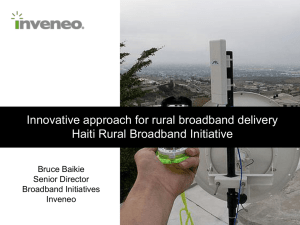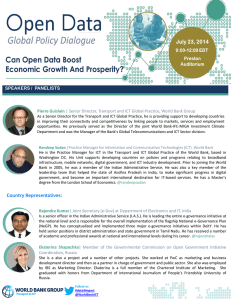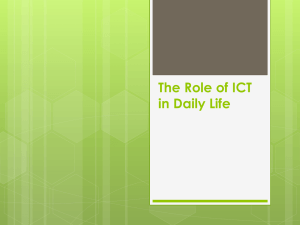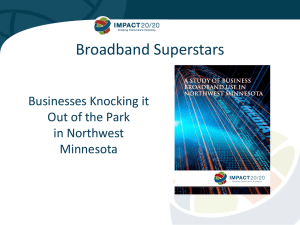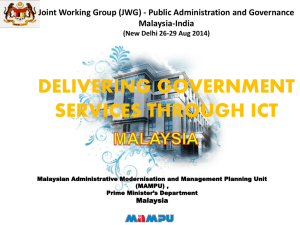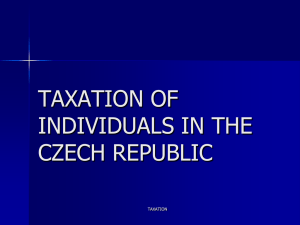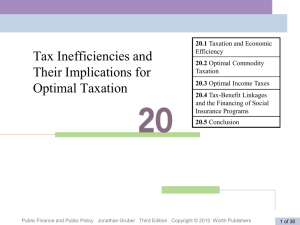BTL PORTABILIDAD
advertisement
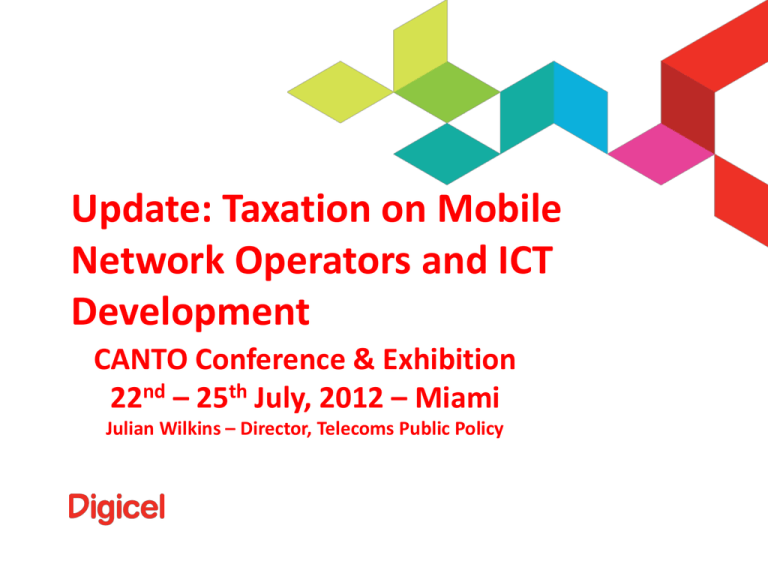
Update: Taxation on Mobile Network Operators and ICT Development CANTO Conference & Exhibition 22nd – 25th July, 2012 – Miami Julian Wilkins – Director, Telecoms Public Policy Taxation on MNOs and ICT Development CANTO Theme: Accelerating Broadband Experience in the Caribbean - transforming the way we live • • • • ICT development – ITU; GSMA; Ericsson; Taxation on MNOs and economic development – relationships – special taxes; Indirect impact of ICT taxation; Conclusions. 2 ICT Development (2) • • • Empirical evidence of diffusion of telecoms services has a spill-over effect on economic growth; A tax which slows down diffusion of telecoms services defers the arrival of benefits; This tax may actually reduce tax revenues by causing the economy to grow more slowly. (Source: ITU Taxing telecommunications/ICT Services – August 2011) 3 ICT Development (3) Recent IDB econometric study specifically for Latin American and the Caribbean region: • Estimated 10% in market penetration of Broadband services increased GDP by 3.2% on average and improves productivity by 2.6% Source: Garcia-Zaballos, A / Lopez-Rivas, R: Governmental control on socioeconomic impact of broadband in LAC countries, working paper. 4 ICT Development (4) Recent report conducted by Ericsson, Arthur d. Little and Chalmers University in 33 OECD countries: • • • Quantifies the isolated impact of Broadband speed, showing that doubling the Broadband speed for an economy increases GDP by 0.3% ; Positive effects come from automated and simplified processes, increased productivity as well as better access to basic services such as education and health; Direct, induced and indirect effects of Broadband speed. Source: Ericsson – Need for speed (September, 2011) 5 Special taxation measures considered or introduced in the Caribbean: • Jamaica: special tax of 25% GCT on calls and handsets as opposed to the ordinary GCT of 17.5% (being reduced to 16.5%); • Anguilla: in November 2010, the Government implemented a 7% levy on telecoms providers; • Belize: a special tax on telecom services of 19% but no tax on BB; • Barbados: in January 2011, the Minister of Finance wrote to Mobile Operators to implement a B$3.00 tax on all post-paid and pre-paid mobile phones - not implemented; • Grenada: in 2009, the Government approved a law to introduce a tax of 20% on mobile phone services. However, this was not implemented. 6 Jamaica (4) – implemented July 15th - Summary • • • • • US7.5c tax on all incoming international calls to mobiles; J$0.05 tax on all calls originating and terminating on Jamaican fixed networks; J$0.40 tax on all other calls originating from Jamaican networks (i.e. outbound domestic and international fixed and mobile); Free minutes will be exempt from the tax subject to the stipulation that only up to 30% of the total time will benefit from such exemption; Regional impact: other Digicel Islands have been forced to remove Jamaica from all plans and bundles effective 15th July, although endeavouring to come back with an alternative. 7 International Monetary Fund The recent IMF country report on the Philippines clearly encourages the Government to introduce additional taxes on mobile operators. ‘…..given the volume and the increase in the usage it (taxation) can be a significant source of revenue with no or little distortionary effects’ (IMF country report no 12/60, p38) ‘Given the fact that tax can be collected by a few telecom operators at the time of service or access is provided, the excise taxation of telecommunications services makes sense for the tax authorities’ (IMF country report No 12/60, p39) • Dr. Hamadoun Toure Secretary General ITU – strong advocate of not introducing special taxes on telecoms 8 International Monetary Fund (2) The IMF has encouraged Governments to place a small excise tax on the phone usage: But rejected by the Philippines who believed it was counterproductive to their ICT agenda. 9 MNO and economic development • • • • • GSMA studies indicate that mobile telecoms taxes were disproportionately high in many developing countries; Additional taxation forces the poorest customers off the network. In other words this directly conflicts with USO objectives; Adopting highly distorting taxation policies can negatively impact the development of mobile Broadband; Even small cuts in taxes may attract more mobile users; Telecoms – high capacity to stimulate growth. 10 European Commission (EC) • • • EC requested Hungary to abolish its ‘special tax’ imposed on telecom operators in October 2010; EC consider illegal under EU telecoms rules as revenue is used for Governments central budget and not meeting the specific costs of regulating the sector; This may be a challenge for some parts of the Caribbean region where ‘special taxes’ end up in a central Government fund. 11 Indirect impact of ICT Taxation – ITU Proposition: Tax on telecoms Roll services are delayed Direct effect on national income – includes ICT output Spill over effect – telecom services used in many other sectors Direct and indirect consequences 12 GSMA “Governments, particularly in developing countries, could consider focusing their taxation strategies to increase economic development rather than adopt policies that may create barriers to more people owning and using a mobile phone.” Source: GSMA - Global Mobile Tax review – November 2011 13 GSMA “we found clear policy inconsistencies between regulations aimed at developing the ICT sector through investment incentives and a culture where ICT firms are perceived as ‘cash cows’ thus taxes are levied.” Source: GSMA - The impact of taxation on the development of the mobile broadband sector – March 2012 14 Conclusions • High tax rates or tax increase for the sake of revenue generation may be counterproductive; • Taxes are particularly damaging at the margin – and force off the network the poorest people in society. The very people Universal Service is aimed at. Extra taxation conflicts with USO; • From empirical evidence, ITU studies show additional special taxes have direct and indirect consequences on a country’s development; • ICT development is placed at risk in our region when the uptake of wireless broadband services is threatened by increases in taxation. 15 Accelerating Broadband Experience in the Caribbean transforming the way we live Taxation article – Page 20 in the CANCION magazine Andrew Gorton’s presentation How Governments have made Broadband network rollout possible Thank you for listening! julian.wilkins@digicelgroup.com 16

